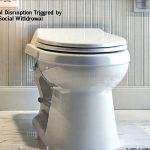Changes in bowel habits are often dismissed as minor inconveniences, easily attributed to dietary shifts or stress. However, for individuals navigating the complexities of mood disorders like depression, anxiety, and bipolar disorder, alterations in stool frequency – particularly a noticeable drop in how often they go – can be a significant, though frequently overlooked, symptom. This isn’t merely about constipation; it’s deeply interwoven with the neurobiological mechanisms underlying these conditions and reflects a complex interplay between mind and body. Understanding this connection is crucial for holistic care and improved patient outcomes, moving beyond simply addressing the psychological symptoms to recognizing the physical manifestations that accompany them.
The gut-brain axis, a bidirectional communication network linking the digestive system and the brain, plays a central role in this phenomenon. Neurotransmitters like serotonin – heavily involved in mood regulation – are largely produced within the gut. When mood disorders disrupt neurotransmitter balance, the entire system feels the effects, including gastrointestinal function. A decrease in stool frequency isn’t just a physical symptom; it’s often a signal that the internal ecosystem is thrown off-kilter, impacting both mental and physical wellbeing. Ignoring this connection can lead to delayed diagnoses, ineffective treatment plans, and unnecessary suffering for those already struggling with significant emotional burdens. Recognizing stool signs is a good starting point for understanding your digestive health.
The Neurobiological Links: Mood Disorders & Gut Motility
The relationship between mood disorders and gastrointestinal function isn’t a simple cause-and-effect scenario; it’s a complex interplay of neurological, hormonal, and immunological factors. Depression, particularly, is frequently associated with decreased gut motility – the speed at which food moves through the digestive tract. This slowdown can directly contribute to reduced stool frequency and constipation. Several mechanisms are thought to be involved:
- Serotonin Imbalance: As mentioned earlier, serotonin plays a vital role in both mood regulation and gastrointestinal motility. Lowered serotonin levels, common in depression, can slow down digestive processes.
- HPA Axis Dysregulation: The hypothalamic-pituitary-adrenal (HPA) axis is the body’s primary stress response system. Chronic stress and mood disorders often lead to HPA axis dysregulation, releasing cortisol which impacts gut function and motility.
- Autonomic Nervous System Impact: Mood disorders can disrupt the autonomic nervous system, which controls involuntary bodily functions like digestion. This disruption can alter nerve signals to the gut, leading to slowed contractions and reduced bowel movements.
Anxiety, while often associated with increased gastrointestinal activity (diarrhea), can paradoxically lead to constipation in some individuals due to chronic muscle tension and stress impacting digestive processes. Bipolar disorder presents a more fluctuating picture; during depressive phases, stool frequency may drop significantly, mirroring the decreased energy levels and motivation. Conversely, during manic or hypomanic phases, gastrointestinal motility might increase, potentially leading to diarrhea or increased urgency. This variability highlights the importance of individualized assessment and treatment. Understanding these neurobiological underpinnings helps explain why changes in bowel habits are not merely “side effects” but integral parts of the mood disorder experience. If you’re experiencing chest pain alongside GERD symptoms, consider looking at GERD and goosebumps.
The Role of Medication & Lifestyle Factors
Many medications used to treat mood disorders can themselves contribute to decreased stool frequency. Selective serotonin reuptake inhibitors (SSRIs) and tricyclic antidepressants, while effective for managing depression and anxiety, often have side effects that include constipation due to their impact on serotonin levels in the gut. Even non-pharmacological interventions like stress management techniques, if overly rigid or demanding, can inadvertently contribute to tension that impacts digestive function.
Lifestyle factors play a crucial role too:
* Diet: A diet low in fiber and fluids is a common contributor to constipation, but even seemingly healthy diets might not provide sufficient bulk for individuals with compromised gut motility.
* Physical Activity: Reduced physical activity – often associated with depression – slows down digestion. Exercise helps stimulate intestinal contractions.
* Hydration: Insufficient fluid intake exacerbates constipation and makes stool harder to pass.
* Sleep Patterns: Disrupted sleep, common in many mood disorders, further impacts the autonomic nervous system and can disrupt gut function.
It’s essential for individuals experiencing a drop in stool frequency alongside a mood disorder episode to openly communicate with their healthcare provider about all medications they are taking – including over-the-counter drugs and supplements – and to discuss lifestyle factors that might be contributing to the issue. A collaborative approach, involving medication review and lifestyle modifications, is often necessary to address this symptom effectively. Understanding stool bacteria ratios can also help inform dietary choices.
Identifying & Assessing Stool Frequency Changes
Accurately identifying a significant change in stool frequency requires self-awareness and consistent monitoring. Keeping a simple bowel diary can be incredibly helpful. This doesn’t need to be overly detailed; simply noting the date and number of bowel movements per day (or week) over several weeks can reveal patterns. Here’s how to approach it:
- Establish Baseline: Track stool frequency for at least one week before a mood disorder episode intensifies, or during a period of relative stability, to establish a personal baseline.
- Monitor During Episodes: Continue tracking throughout the course of the mood disorder episode. Look for significant deviations from the established baseline. A drop in frequency – even if it doesn’t meet the clinical definition of constipation – should be noted.
- Consider Bristol Stool Scale: Familiarize yourself with the Bristol Stool Scale, a visual chart that classifies stool types based on consistency. This can help differentiate between normal variations and concerning changes.
It’s important to avoid self-diagnosis or alarmist interpretations. A temporary change in bowel habits is often not cause for concern, but persistent drops in frequency coupled with other symptoms (abdominal pain, bloating, nausea) warrant medical attention. Communicating these observations honestly with a healthcare professional is the first step toward understanding and addressing the issue. Top early signs from stool tests can provide valuable information for your doctor.
Differentiating from Other Causes of Constipation
While mood disorders can certainly contribute to decreased stool frequency, it’s crucial to rule out other potential causes before attributing it solely to mental health conditions. Many medical conditions and medications can cause constipation independently:
* Underlying Medical Conditions: Irritable bowel syndrome (IBS), hypothyroidism, neurological disorders, and certain cancers can all lead to constipation.
* Medication Side Effects: Opioid pain relievers, iron supplements, calcium channel blockers, and antihistamines are common culprits.
* Dietary Factors: Insufficient fiber intake, dehydration, and food intolerances can contribute.
A thorough medical evaluation is necessary to differentiate between these possibilities. This might involve:
1. Physical Examination: A doctor will assess your overall health and perform a physical examination of the abdomen.
2. Blood Tests: To rule out underlying medical conditions like hypothyroidism or anemia.
3. Stool Tests: In some cases, stool tests may be ordered to check for infections or other abnormalities.
Never assume that constipation is solely due to your mood disorder without seeking a professional evaluation. It’s possible (and even common) for multiple factors to contribute to the issue. Understanding GERD and sudden mood shifts can also help understand the connection between gut health and emotional state.
Strategies for Management & Support
Managing decreased stool frequency associated with mood disorders requires a multifaceted approach, focusing on both addressing the underlying mental health condition and mitigating the gastrointestinal symptoms.
* Prioritize Mental Health Treatment: This is paramount. Effective treatment of the mood disorder itself often leads to improvement in gut function.
* Lifestyle Modifications: Increase fiber intake gradually (fruits, vegetables, whole grains), stay adequately hydrated, and incorporate regular physical activity into your routine – even short walks can help.
* Medication Review: Discuss potential side effects with your doctor and explore alternative medications if constipation is a significant issue.
* Probiotics & Prebiotics: While more research is needed, some studies suggest that probiotics (beneficial bacteria) and prebiotics (food for beneficial bacteria) may help restore gut health. Consult with a healthcare professional before starting any new supplements.
It’s also crucial to practice self-compassion and avoid fixating on bowel movements. Stressing about constipation can paradoxically worsen the problem. Remember that managing both your mental and physical wellbeing is an ongoing process, requiring patience, persistence, and open communication with your healthcare team. Consider tools for gut checks to proactively monitor digestive health.


















